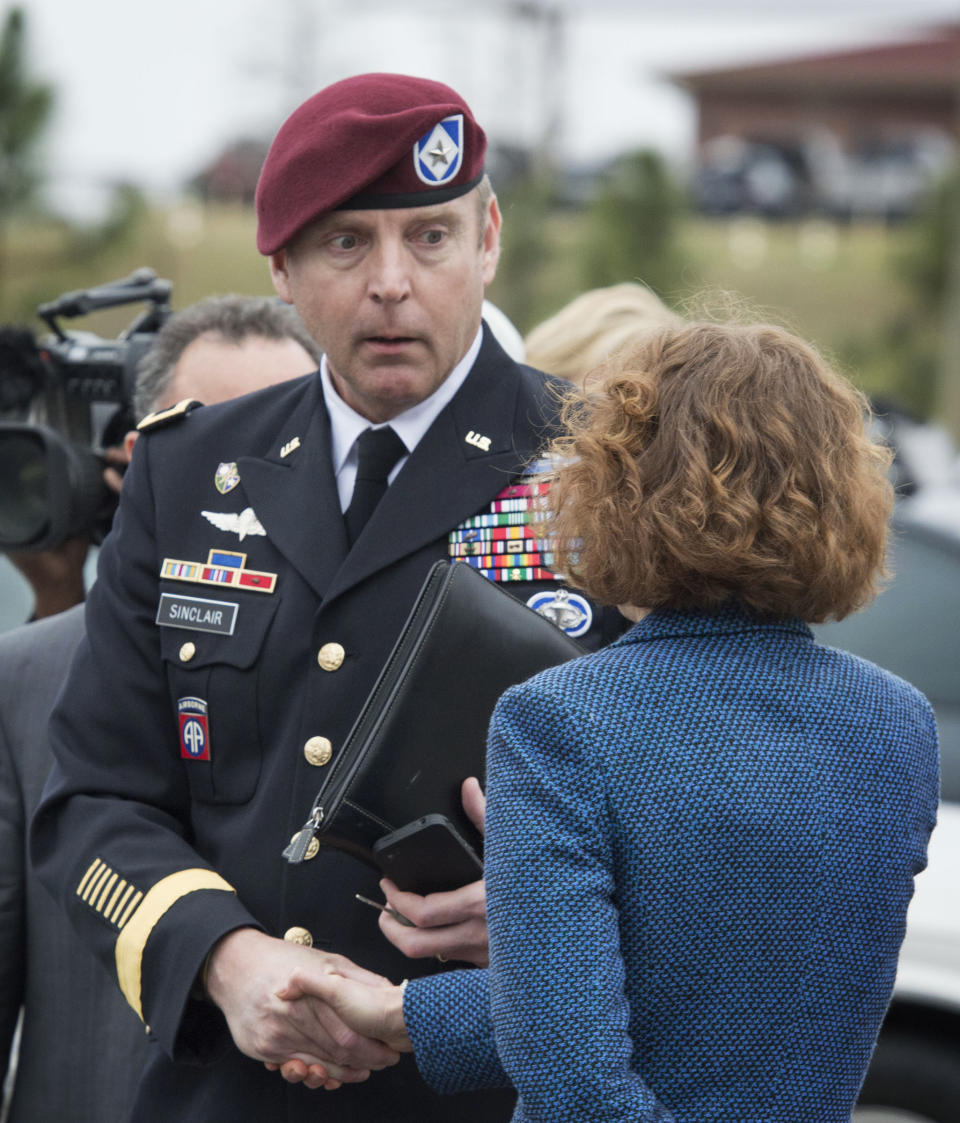2nd day of sentencing in Army general sex case
FORT BRAGG, N.C. (AP) — Lawyers for an Army general who admitted to emotionally harming a subordinate during an affair will argue Tuesday he shouldn't face jail time for a crime that civilians wouldn't be prosecuted for.
A judge on Monday accepted a plea deal that included the dropping of sexual assault charges against Brig. Gen. Jeffrey Sinclair in exchange for him admitting to other violations of military law. Now, his lawyers are seeking a lenient sentence by downplaying the seriousness of those charges and calling witnesses to discuss the character of the former deputy commander of the 82nd Airborne.
The sentencing began Monday with prosecutors calling the accuser and her mother to discuss damage caused to her personal and professional life by her interactions with Sinclair. Prosecutors told the judge they have a few more witnesses to talk about how Sinclair's behavior hurt the three subordinates with whom he admitted to having inappropriate relationships.
Then Sinclair's lawyers are expected to call about 20 witnesses, including commanders who Sinclair served under and soldiers he led. Sinclair himself will give a statement and may even testify, defense attorney Richard Scheff said.
The captain who's his primary accuser took the stand Monday and said she can't trust anyone and fears her superiors are always going to take advantage of her. She said as their relationship soured, she fell into despair so deep that she threatened to kill herself so the general would listen to her.
The Associated Press generally does not identify those who say they were victims of sexual assault.
"I'm very guarded now. I have a hard time trusting people. I have a very hard time feeling safe," said the woman, who cried during testimony and occasionally dabbed her eyes with a tissue between questions.
Sinclair, 51, had been accused of twice forcing the female captain under his command to perform oral sex during the three-year extramarital affair. A lawyer who advised the accuser issued a statement Monday saying she stood by the assault accusation.
The married general pleaded guilty earlier this month to having improper relationships with three subordinate officers, including the captain. He also pleaded guilty to adultery, which is a crime in the military.
The most serious accusations went to trial, but the court-martial was halted after the military judge found evidence that there may have been improper influence in a decision to reject a previous plea deal. The new deal was then struck, including Sinclair's admission that his treatment of the captain was "unwarranted, unjustified and unnecessary," broke military law and mentally harmed her.
Sinclair also admitted Monday to abusing a government credit card he used while traveling to visit his mistress, using indecent language to demean female officers and contacting the accuser after being told not to.
Sinclair spoke in court Monday, showing emotion for the first time after being stoic during previous hearings.
"I failed her as a leader and as a mentor and caused harm to her emotional state," Sinclair said, his voice catching as he read from a statement. He asked the judge for a break and took a long drink of water before continuing to read.
"I created a situation over time that caused her emotional harm," Sinclair said, seated in his dress blue uniform.
Ultimately, the judge will give Sinclair a sentence that can't exceed terms in the agreement struck between defense lawyers and military attorneys over the weekend, but has not been made public. The legal agreement is likely to require a punishment far less severe than the maximum penalties of 21 ½ years in prison and dismissal from the Army.
Sinclair's own lawyer suggested he might walk out of court a free man, but without a career and perhaps with hundreds of thousands of dollars less in pension benefits. The 27-year veteran was the former commander of the 82nd Airborne.
"I hope he is permitted to retire at a reduced rank and can go home to his family," Scheff said.
The Army's case against Sinclair started to crumble as questions arose about whether his primary accuser had lied in a pre-trial hearing. It was further thrown into jeopardy last week when Judge Col. James Pohl said the military may have improperly pressed ahead with the trial to send a message about its determination to curb rape and other widespread misconduct. Under the military code of justice, the decision was supposed to be decided solely on the evidence, not its broader political implications.
A different commander accepted a plea deal over the weekend.
Sinclair's lawyers plan to use the sentencing hearing to argue that the accuser's story has changed several times and she exaggerated her anguish over the relationship and the damage it caused.
"She answers one way, then she answers another," Scheff said outside court Monday.
___
Michael Biesecker contributed to this report from Raleigh, N.C.
___
Follow Jeffrey Collins on Twitter at http://twitter.com/JSCollinsAP .

 Yahoo News
Yahoo News 


